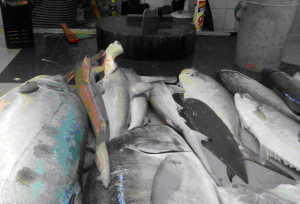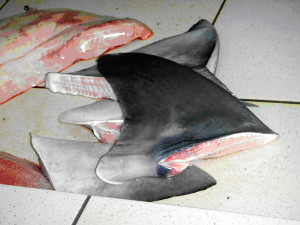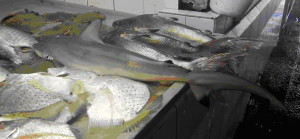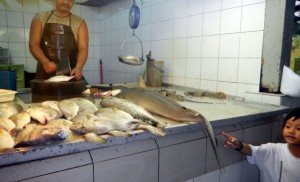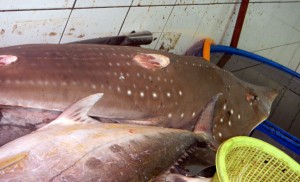Marine Life & Conservation
Recent updates about the Shark situation in South East Asia

As we all know an approximate number of 100 million sharks are killed every year to support the demand for shark fin soup, mainly from countries in South East Asia.
In China the growing middle class are craving to eat this dish which was classified as a traditional wedding treat and served at state banquets; however, many Chinese hotels like Shangri-La has recently banned the soup from their regular menu and many other high class restaurants in the neighboring countries are following suit.
BAD NEWS
Last week terrible news came from one of Hong Kong´s conservationists groups – a whale shark factory was found that processed over 600 Whale Sharks annually. These giant animals are hunted not only because of their valuable fins but also for their liver. A shark liver can be a third of the size of a sharks body and the oil is an essential ingredient in the preparation of cosmetics like lipsticks and creams.
Alex Hofford and Paul Hilton of WildLifeRisk, the conservationists group that discovered the factory, said:
“How these harmless creatures, these gentle giants of the deep, can be slaughtered on such an industrial scale is beyond belief, and all for human vanity; lipsticks, face creams, health supplements, shark fin soup restaurants. We firmly believe the trade must stop, and it must stop now, or else these animals will eventually face extinction.”
When resources run scarce, old battles resurface; China is again debating with surrounding countries like the Philippines, Vietnam, Taiwan, Malaysia and Brunei over South China Sea fishing rights.
China has imposed a new law that bans foreign vessels in “Beijing claimed areas” and the Philippines has said this is illegal and a serious threat to the peace in the area, since China claims almost the entire South China Sea as their own. The Philippines has tried to arbitrate under the UNCLOS (United Nations Convention on the Law of Sea) to make Chinas claim illegal.
Chinese official sources said “the fisheries conservation regulations had been issued and published by China since the 1980s. There was no reaction from the Philippines then and yet these are the very same rules that are being attacked today.”
To be continued….
In other areas in the Philippines, Marine Biologists are criticizing fisherman over their new method of making money; they are “hand feeding” whale sharks in order to attract tourists.
This practice has become highly popular, and since sightings of these giants is practically guaranteed, the fishermen can earn a lot more money and spend less time working too.
The Marine biologists claim this practice disturbs the whale shark’s natural behavior and increases disease and parasites, and they are conducting a study to observe the change over time.
These kind of stories where conservation only takes place when there is a demand or monetary interest will unfortunately become more common in the future.
But isn’t it better to have the whale shark hand fed than in whale shark fin soup?
GOOD NEWS
Indonesia has created the country’s first shark and manta ray sanctuary. Created at the beginning of 2013 and based in Raja Ampat, it’s the first in the Coral Triangle. 6 months later, Komodo with it´s 7,000 sq km has also joined other areas of Indonesia to protect its sharks and rays.
Indonesia is an important country because it’s one of the world’s biggest fisher and exporter of sharks, so the sanctuaries are extremely vital for the area and a good sign of a will to save wildlife for tourism (as sharks and rays bring in more for money alive then dead).
The Sultanate of Brunei has become the first Asian country to ban shark finning, effective from January 2014. Routine checks on establishments will be conducted to ensure the ban is followed.
The Sultan Hassanai Bolkiah Mu’izzaddin Waddaulah has banned the catch and landing of all shark species from the waters of Brunei Darussalam, as well as shark fin sales in the domestic market, and the importation and trade of shark products.
This is a law that has not even been achieved in countries like the United States, so for an Asian country this is very progressive.
Shark meat used to be sold at the market at very cheap prices, only the fins are more expensive and most of the times already sold before reaching the market.
Photos taken before the implementation of the law for shark Finnning, Fish market, Jerudong , Brunei Darussalam in December 2013.
Neighboring areas to Brunei like Northern Sabah are trying to follow the steps of Brunei, but the Southern region of Sarawak is far from acknowledging this law. The general manager of the Protected Areas and Biodiversity Conservation Division Oswald Braken Tisen said recently:
“Not all sharks are protected species, and selling of shark’s fin and consuming it is still not against the law.”
The Shark experts’ opinions are unanimous: “Laws to restrict trade will mean little unless there are total bans on fishing.”
After checking up on how the new law about shark protection is affecting the fish market in Jerudong in Brunei Darussalam, I attach these two pictures from the 6th of February.
Sharks are still openly displayed on the counter, some still with their fins, and some guitar fish without fins. I have tried to reach the Ministry´s fisheries for a comment but they are still busy with Chinese New Year celebration and are proving difficult to reach.
I’ll try again next week….
Blogs
Invitation from The Ocean Cleanup for San Francisco port call

6 years ago, The Ocean Cleanup set sail for the Great Pacific Garbage Patch with one goal: to develop the technology to be able to relegate the patch to the history books. On 6 September 2024, The Ocean Cleanup fleet returns to San Francisco bringing with it System 03 to announce the next phase of the cleanup of the Great Pacific Garbage Patch and to offer you a chance to view our cleanup system up-close and personal.
We look forward to seeing you there.
To confirm your presence, please RSVP to press@theoceancleanup.com
PROGRAM
Join The Ocean Cleanup as our two iconic ships and the extraction System 03 return to San Francisco, 6 years and over 100 extractions after we set sail, to create and validate the technology needed to rid the oceans of plastic.
Our founder and CEO, Boyan Slat, will announce the next steps for the cleanup of the Great Pacific Garbage Patch. Giving you a chance to view our cleanup system and the plastic extracted.
Hear important news on what’s next in the mission of The Ocean Cleanup as it seeks to make its mission of ridding the world’s oceans of plastic an achievable and realistic goal.
Interviews and vessel tours are available on request.
PRACTICALITIES
Date: September 6, 2024
Press conference: 12 pm (noon)
Location: The Exploratorium (Google Maps)
Pier 15 (Embarcadero at Green Street), San Francisco, CA
Parking: Visit The Exploratorium’s website for details.
RSVP: press@theoceancleanup.com
Video & photo material from several viewing spots around the bay
We look forward to seeing you there!
ABOUT THE OCEAN CLEANUP
The Ocean Cleanup is an international non-profit that develops and scales technologies to rid the world’s oceans of plastic. They aim to achieve this goal through a dual strategy: intercepting in rivers to stop the flow and cleaning up what has already accumulated in the ocean. For the latter, The Ocean Cleanup develops and deploys large-scale systems to efficiently concentrate the plastic for periodic removal. This plastic is tracked and traced to certify claims of origin when recycling it into new products. To curb the tide via rivers, The Ocean Cleanup has developed Interceptor™ Solutions to halt and extract riverine plastic before it reaches the ocean. As of June 2024, the non-profit has collected over 12 million kilograms (26.4 million pounds) of plastic from aquatic ecosystems around the world. Founded in 2013 by Boyan Slat, The Ocean Cleanup now employs a broadly multi-disciplined team of approximately 140. The foundation is headquartered in Rotterdam, the Netherlands, and opened its first regional office in Kuala Lumpur, Malaysia, in 2023.
Find out more about The Ocean Cleanup at www.theoceancleanup.com.
Marine Life & Conservation
SHARK MONTH ARRIVES AT ROYAL WILLIAM YARD, PLYMOUTH

A shark has been spotted approaching Royal William Yard in Plymouth, much to the surprise of swimmers, paddleboarders and onlookers.
With its distinctive dorsal fin cutting through the water, the sizeable shark swam along the coastline, before turning to head inland towards Firestone Arch at Royal William Yard. The appearance drew a crowd, who were captivated for more than an hour by the unusual sight – and it was all caught on video.
The shark is one of many expected sightings at Royal William Yard over the coming weeks… because today marks the start of Shark Month!
In reality, the ‘shark’ spotted along the Plymouth shoreline was actually a custom-made model, created by the team at Royal William Yard and sailed underwater by Caroline Robertson‑Brown from the Shark Trust, who donned scuba diving gear for the occasion.
The stunt took place to launch Shark Month in style and draw attention to the work of the leading international conservation charity, which is based in Britain’s Ocean City. Spectators were reassured that the water was safe and many entered into the spirit of the performance, swimming or sailing alongside the shark.
Shark Month will take place across Royal William Yard throughout July and will feature an extravaganza of art, entertainment and advocacy for everyone to enjoy. The packed programme of events starts with an art exhibition and ends with a trip on paddleboards with shark experts – with everything from a shark quiz to a Jaws screening in between.
Paul Cox, CEO of the Shark Trust, said: “There are often assumptions and misconceptions when it comes to sharks. This was certainly the case with the shark spotted at Royal William Yard! While the British coastline is home to many species of shark, this was not one of them. However, we’re thrilled it caught people’s attention, because seeing a shark is a special and memorable moment. That is precisely why we want to celebrate these incredible creatures, highlight the need for conservation, and ask for help to safeguard their future.”
For more information about Shark Month at Royal William Yard, visit the Shark Trust Website.
Images and video: Jay Stone
-

 Blogs2 months ago
Blogs2 months agoDiving With… Nico, Ocean Earth Travels, Indonesia
-

 News1 month ago
News1 month agoMurex Bangka Announce New Oceanfront Cottages & Beachfront Dining
-

 Blogs2 months ago
Blogs2 months agoA new idea in freediving from RAID
-

 Marine Life & Conservation1 month ago
Marine Life & Conservation1 month agoIceland issue millionaire whale hunter a licence to murder 128 vulnerable fin whales
-

 Marine Life & Conservation2 months ago
Marine Life & Conservation2 months agoThe Shark Trust Great Shark Snapshot is back
-

 News3 months ago
News3 months agoCharting New Waters; NovoScuba Goes Global with the Launch of their Revolutionary Dive Training Agency!
-

 Gear News1 month ago
Gear News1 month agoNew Suunto Ocean – a dive computer and GPS sports watch in one for adventures below and above the surface
-

 Marine Life & Conservation Blogs2 months ago
Marine Life & Conservation Blogs2 months agoBook Review: Plankton


